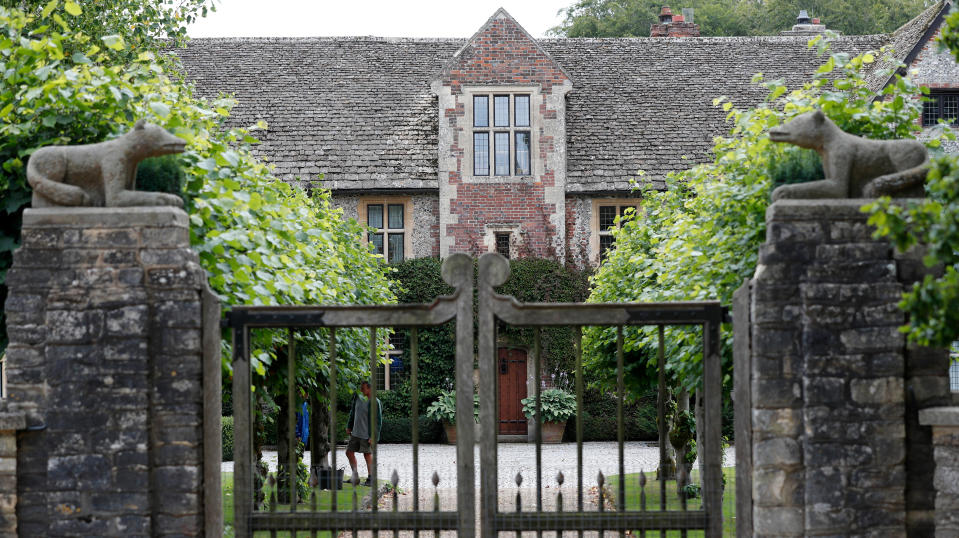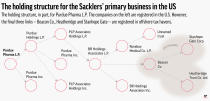Family's web makes it hard to track cash from opioid maker
Cities and states suing Purdue Pharma L.P. for its role in the opioid crisis say its family owners withdrew billions in profits. But where is that money and how much should be fair game in ongoing settlement talks?
Answers are complicated by the way members of the Sackler family have shielded their wealth in a web of companies and trusts, a review by The Associated Press has found. Some are registered in offshore tax havens far from Purdue's Connecticut headquarters.
The web's complexity and offshore reach could affect the calculus for government lawyers as they pursue the company, including how to calibrate demands in settlement negotiations.
All but two U.S. states and 2,000 local governments have taken legal action against Purdue, other manufacturers and distributors. Sixteen states have sued family members by name.
Purdue's CEO has said the company could file for bankruptcy. And this week, news organizations reported that Purdue, the family and government lawyers are negotiating a possible settlement, valued at $10 billion to $12 billion, that would see the Sacklers give up company ownership and contribute $3 billion of their own money.
But AP's review of court papers, securities filings by companies that have had dealings with Purdue, and documents leaked from an exclusive Bermuda law firm, show how the family has tried to protect its wealth.
"The Sacklers allegedly moved significant money offshore, which potentially would make it harder for any judgment creditor to reach," said Mark Chalos, a lawyer representing counties and cities including Nashville, Tennessee, in suits against opioids makers.
"This is the real question and you're seeing it playing out in a lot of different states in different ways," said Elizabeth Chamblee Burch, a professor of law at the University of Georgia. "How do you make sure that they (the Sacklers) are not siphoning off those assets and hiding them away?"
A representative for the family of Purdue co-founder Mortimer Sackler declined to comment for this story, as did a company spokeswoman. A representative for the relatives of Raymond Sackler, Purdue's other scion, did not respond to a request for comment.
When the Oxycontin maker plead guilty in 2007 to a federal charge it mislead the public about the drug's risks, it listed 215 companies under its umbrella. But that did not include some companies used to manage property and investments for family members or the trusts, some offshore, set up to administer their fortunes.
Some offshore entities "appear to have served as conduits for monies from Purdue," a lawyer for New York's attorney general wrote recently to the judge presiding over the state's lawsuit.
Many companies set up limited partnerships and subsidiaries to cap shareholder liabilities and many wealthy individuals manage investments through opaque entities.
But an examination of the Sacklers' web shows striking complexity, while revealing links between far-flung holdings.
A British estate owned by Theresa Sackler, widow of one of Purdue's founders and a former board member, is one example. On paper, it is owned and run by a handful of companies, most based in Bermuda, all controlled by an offshore trust.
But documents leaked from Appleby, a Bermuda law firm employed by numerous wealthy clients, show that the companies belong to the Sacklers, among at least 30 island-based entities controlled through family trusts.
It has long been known that the Sacklers use Bermuda as a base for Mundipharma, a network of companies set up to do business outside North America. But their island portfolio also includes family foundations and an insurer, according to documents leaked in 2017 to the German newspaper Suddeutsche Zeitung. The documents, among millions known as the Paradise Papers, were shared with the International Consortium of Investigative Journalists which provided access to the AP.
The Sacklers' use of offshore holding companies and trusts is telling, said Jeffrey Winters, a Northwestern University professor whose research focuses on how the powerful protect their fortunes.
"One would not put those trusts there if you didn't see some wealth defense benefit," Winters said. "It's very hard to see what's in there and it's very hard to seize what's in there. That's the purpose."
But David S. Neufeld, an international tax lawyer who works with wealthy clients and closely held companies, said the layered, partly offshore structure used to control Purdue, while not typical, is also not that uncommon.
"Somewhere in this picture is a desire to limit exposure to business liabilities. That's not, in and of itself, a problem. That's the very nature" of setting up a corporation, Neufeld said.
The Sacklers had an estimated net worth of $13 billion as of 2016, making them America's 19th-richest family, according to Forbes magazine. One of their largest holdings outside pharmaceuticals appears to be an estimated $1.7 billion portfolio in a family company, Cap 1 LLC, that recently sold a stake in 17 U.S. ski resorts.
Massachusetts, New York and other states are alleging that the family has worked methodically to move money out of Purdue to insulate their fortune.
The family's withdrawal of substantial sums from Purdue was noted by Dr. Richard Sackler, the former president and chairman, in a 2014 email to his sons, filed as an exhibit in court proceedings.
"In the years when the business was producing massive amounts of cash," he wrote, "the shareholders departed from the practice of our industry peers and took the money out of the business."
He did not need to remind his sons that the only shareholders of Purdue are Sacklers.
It is not clear where the money drawn from Purdue ended up. New York's attorney general alleges that the Sacklers sent it offshore to "unknown trusts, partnerships, companies" and other entities they control.
Lawsuits allege that the Sacklers' money management decisions were framed by their awareness of state investigations of Purdue.
"Despite this knowledge, the Sackler defendants continued to vote to have Purdue pay the Sackler Families significant distributions and send money to offshore companies," Nevada's lawsuit says.
Purdue agreed in March to a $270 million settlement with the state of Oklahoma to avoid going to trial. That included $75 million from the Sacklers.
A federal judge in Cleveland overseeing suits by local governments has pushed all parties to work toward a nationwide settlement. The resulting negotiations have included representatives for some of the state attorneys general who have filed suit.
The first federal trials are scheduled to start in October. Unless there's a settlement, family members could face more questions about their decisions to move money out of Purdue, some of it offshore.
At trial, lawyers for states and cities would "need to prove that the transfer of the money to these offshore accounts were made with fraudulent intent," said William J. Moon, a professor of law at the University of Maryland.
Getting a judge to seize Sackler assets in the U.S. would require government lawyers to show they're likely to win the case, Miami attorney Gregory Grossman said. But it would be far easier than getting a U.S. judge to freeze offshore assets, he said.
"How comfortable is the court with ordering the seizure of things that are not in their jurisdiction?" Grossman said. "If they are comfortable, will they get cooperation with folks on the other side of the pond?"














